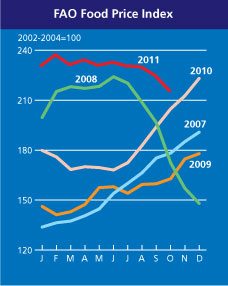So says the Center for Global Development’s (CGD) Kimberly Ann Elliott in a recent post:
As a start, CGD colleague Connie Veillette and John Norris from the Center for American Progress identified five ways to “make aid more effective and save more than $2 billion.” Three of their five recommendations involve cuts in subsidies for farmers, shippers, and NGOs that would make US food aid policies more flexible, responsive, and development-friendly… and save a half billion dollars. In addition, Connie and John recommended cutting at least $1.5 billion from farm subsidies, which go disproportionately to larger, richer producers.
Increasingly in the congressional debate, the $5 billion in “direct payments” that go to farmers every year — regardless of crop prices or yields, and on top of any other subsidies they receive — have moved squarely into the budget-cutting bulls eye. Eliminating those payments, which were created almost two decades ago as part of a failed effort to reform farm subsidies, is certainly justified, but those payments are delinked from production and cutting them would do little to reduce the global distortions imposed on developing-country producers. There is also another $10-12 billion in trade-distorting subsidies that undermine incentives to invest in agriculture in developing countries – those should not escape the budget ax.
I have addressed this topic many times on this blog in order to make the exact same point Connie Veillette and John Norris make. In chronological order:

Malthus, Africa’s Albertine Rift, and Underappreciated Development Economists
From an article in the November 2011 issue of National Geographic magazine on Africa’s Albertine Rift:
By the mid-1980s every acre of arable land outside the parks was being farmed. Sons were inheriting increasingly smaller plots of land, if any at all. Soils were depleted. Tensions were high. Belgian economists Catherine André and Jean-Philippe Platteau conducted a study of land disputes in one region in Rwanda before the genocide and found that more and more households were struggling to feed themselves on little land. Interviewing residents after the genocide, the researchers found it was not uncommon to hear Rwandans argue that “war is necessary to wipe out an excess of population and to bring numbers into line with the available land resources.” Thomas Malthus, the famed English economist who posited that population growth would outstrip the planet’s ability to sustain it unless kept in check by starvation, disease, or war, couldn’t have put it more succinctly.